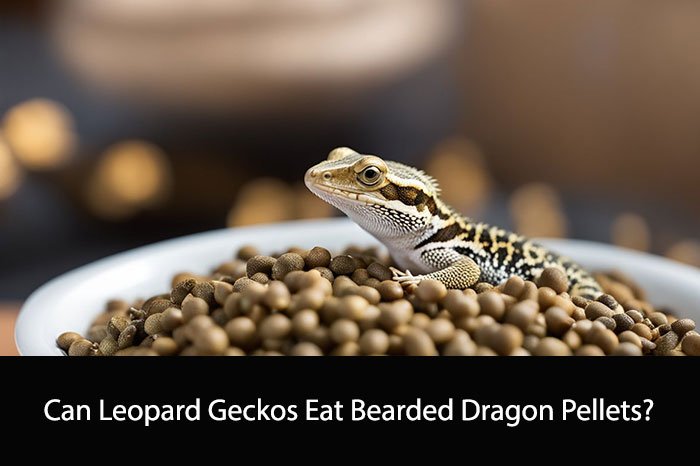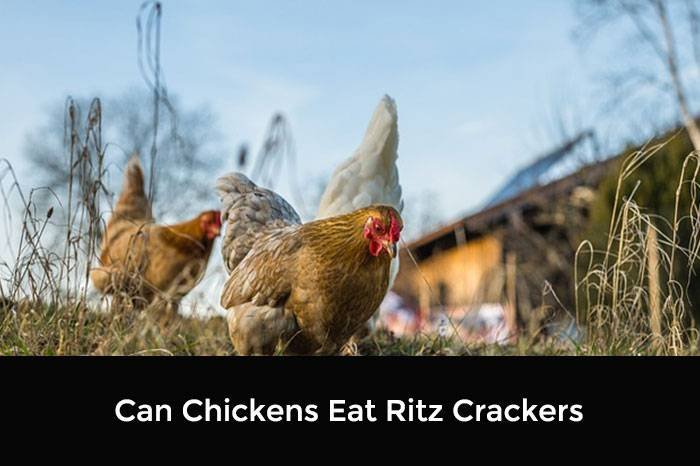Leopard geckos are popular pets due to their docile nature and low maintenance requirements. However, like all pets, they require a balanced diet to stay healthy. Many owners wonder if they can feed their leopard geckos bearded dragon pellets, a common food for another type of pet lizard.
Bearded dragon pellets are formulated to meet the specific nutritional needs of bearded dragons, which have different dietary requirements than leopard geckos. While bearded dragon pellets may contain some of the nutrients that leopard geckos need, they may also contain ingredients that are harmful to them. Therefore, it is important to understand the nutritional needs of leopard geckos and the potential risks of feeding them bearded dragon pellets before adding them to their diet.
Dietary Requirements of Leopard Geckos
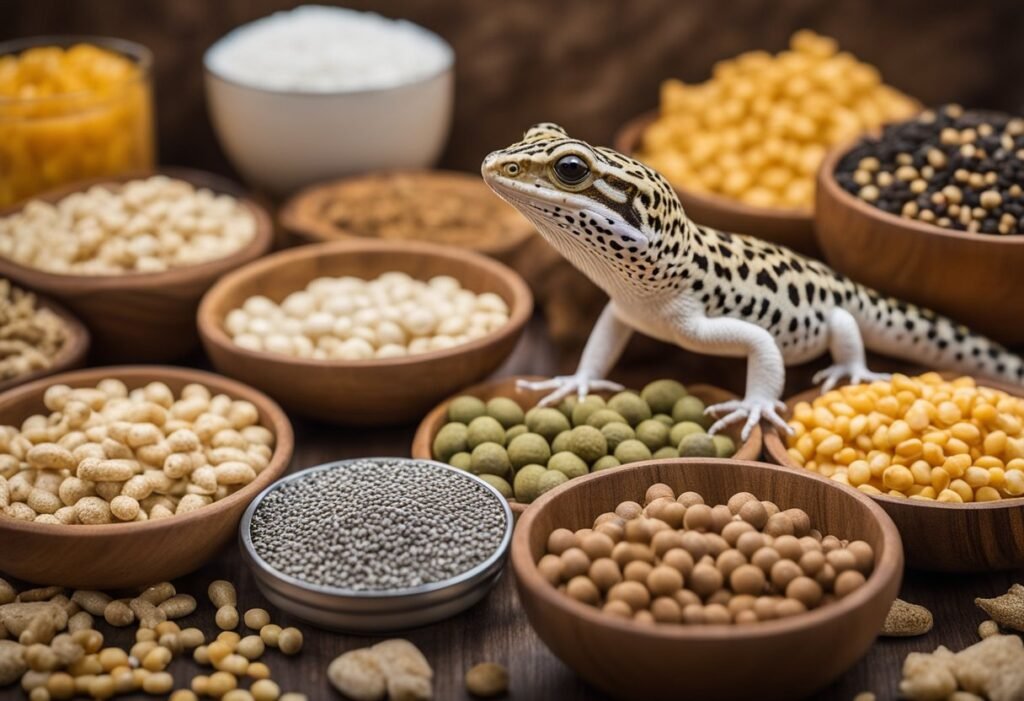
Nutritional Needs
Leopard geckos are insectivores, meaning they eat insects as their primary source of nutrition. In the wild, they consume a variety of insects such as crickets, mealworms, and waxworms. These insects provide the necessary protein, fat, and carbohydrates that leopard geckos need to survive.
In captivity, it is important to provide a balanced diet for leopard geckos. While they can eat bearded dragon pellets, they should not be the sole source of nutrition. Bearded dragon pellets are formulated for the specific nutritional needs of bearded dragons and may not provide all the necessary nutrients for leopard geckos.
In addition to insects, leopard geckos also require calcium and vitamin D3 for proper bone health. Calcium can be provided through calcium powder, which can be dusted on the insects before feeding. Vitamin D3 can be obtained through exposure to UVB lighting.
Feeding Frequency
Leopard geckos should be fed daily or every other day, depending on their age and size. Juvenile leopard geckos require more frequent feedings than adult geckos. It is important not to overfeed leopard geckos as obesity can lead to health issues.
Leopard geckos are nocturnal, meaning they are most active at night. Therefore, it is best to feed them in the evening or at night. Insects should be offered in a shallow dish or directly on the substrate to allow the gecko to hunt and forage.
In conclusion, leopard geckos require a balanced diet that consists primarily of insects. While bearded dragon pellets can be included in their diet, they should not be the sole source of nutrition. It is important to provide calcium and vitamin D3 for proper bone health and to feed leopard geckos in moderation to prevent obesity.
Bearded Dragon Pellets as Food
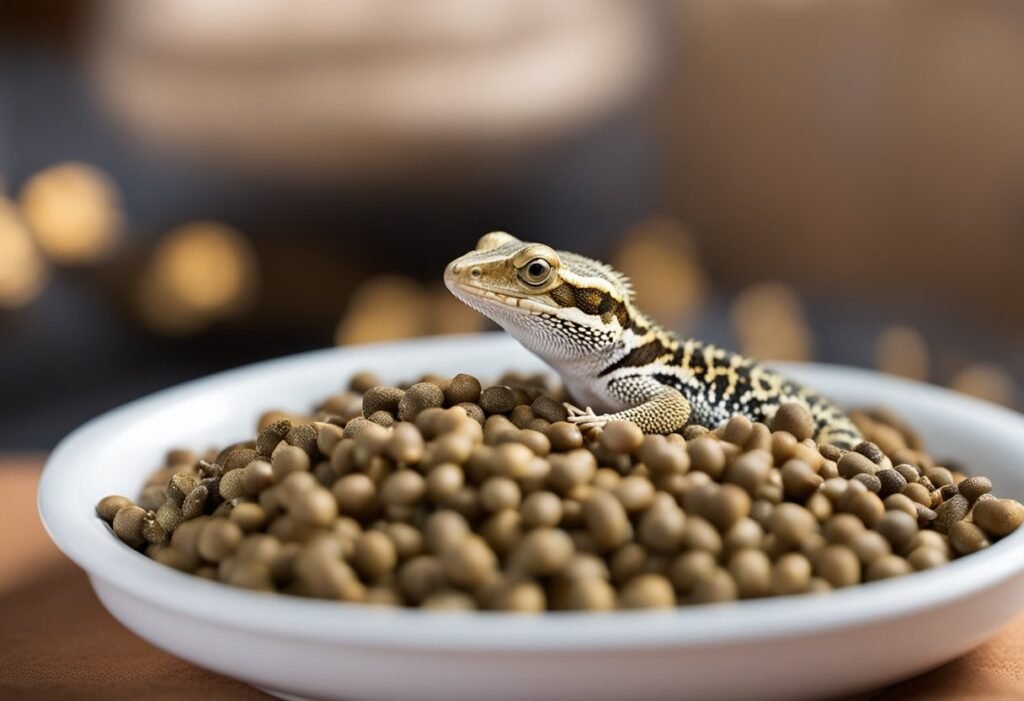
When considering feeding leopard geckos, it’s important to provide them with a balanced diet to ensure they receive all the necessary nutrients. One question that often arises is whether bearded dragon pellets can be used as a food source for leopard geckos.
Ingredient Analysis
Bearded dragon pellets typically contain a variety of ingredients such as grains, vegetables, and meat. While these ingredients may be suitable for bearded dragons, they may not provide the necessary nutrients for leopard geckos.
Leopard geckos are primarily insectivores, meaning they require a diet high in protein and low in fat. While some bearded dragon pellets may contain protein, they may also contain high amounts of fat and carbohydrates, which can lead to health issues in leopard geckos.
Pellet Size and Digestibility
Another consideration when feeding bearded dragon pellets to leopard geckos is the size of the pellets. Bearded dragon pellets are often larger than the food items that leopard geckos naturally consume, such as crickets and mealworms.
Leopard geckos have small mouths and may have difficulty swallowing large pellets, which can lead to choking or digestive issues. Additionally, bearded dragon pellets may not be as easily digestible as insects, which can also lead to digestive problems.
In conclusion, while bearded dragon pellets may contain some beneficial nutrients, they may not be the best food source for leopard geckos. It’s important to provide leopard geckos with a balanced diet that includes a variety of insects and other appropriate food items to ensure their health and well-being.
Potential Health Impacts
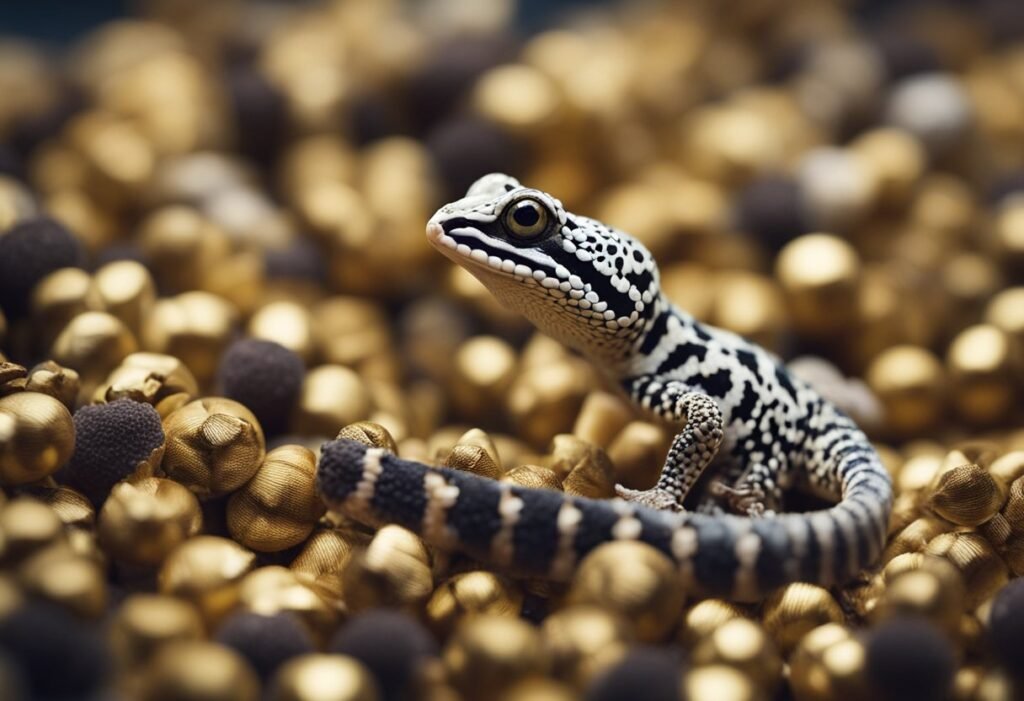
When considering feeding leopard geckos bearded dragon pellets, there are potential health impacts that should be taken into account.
Risk of Nutritional Imbalance
Bearded dragon pellets are formulated to meet the nutritional needs of bearded dragons, not leopard geckos. Feeding leopard geckos bearded dragon pellets as a primary food source can result in a nutritional imbalance, which can lead to health problems over time. For example, bearded dragon pellets may contain high levels of vitamin D3, which can be toxic to leopard geckos if consumed in excess.
To avoid nutritional imbalances, it is important to provide leopard geckos with a varied diet that includes a variety of insects, such as crickets, mealworms, and waxworms, as well as occasional treats like fruit and vegetables.
Gastrointestinal Concerns
Leopard geckos have different digestive systems than bearded dragons, and feeding them bearded dragon pellets can lead to gastrointestinal issues. Bearded dragon pellets may be too large for leopard geckos to digest properly, which can result in impaction, a condition where the digestive tract becomes blocked by undigested food.
In addition, bearded dragon pellets may contain ingredients that are not suitable for leopard geckos, such as fillers or preservatives. These ingredients can cause digestive upset and other health problems.
Overall, while bearded dragon pellets may be a convenient option for feeding leopard geckos, they are not recommended as a primary food source. It is important to provide leopard geckos with a varied diet that meets their specific nutritional needs to ensure their long-term health and well-being.
Safe Feeding Practices
When feeding leopard geckos, it is important to follow safe feeding practices to ensure their health and well-being. Here are some tips to keep in mind when feeding bearded dragon pellets to your leopard gecko.
Supplement Inclusion
While bearded dragon pellets can be a good source of nutrition for leopard geckos, it is important to remember that they should not be the sole source of their diet. In order to ensure that leopard geckos are getting all of the necessary nutrients, it is important to supplement their diet with other foods such as insects and vegetables.
When feeding bearded dragon pellets, it is recommended to mix them with other foods to create a balanced diet. This can be done by adding insects such as crickets or mealworms, as well as vegetables such as carrots or leafy greens.
Hydration Considerations
Another important factor to consider when feeding bearded dragon pellets to leopard geckos is hydration. Bearded dragon pellets are typically dry and do not provide much moisture, which can lead to dehydration in leopard geckos.
To prevent dehydration, it is important to provide a source of water for leopard geckos at all times. This can be done by placing a shallow dish of water in their enclosure. It is also important to mist their enclosure regularly to provide additional moisture.
In conclusion, bearded dragon pellets can be a good source of nutrition for leopard geckos when used as part of a balanced diet. By following safe feeding practices and supplementing their diet with other foods, as well as ensuring proper hydration, leopard geckos can thrive and live a healthy life.
Alternatives to Bearded Dragon Pellets
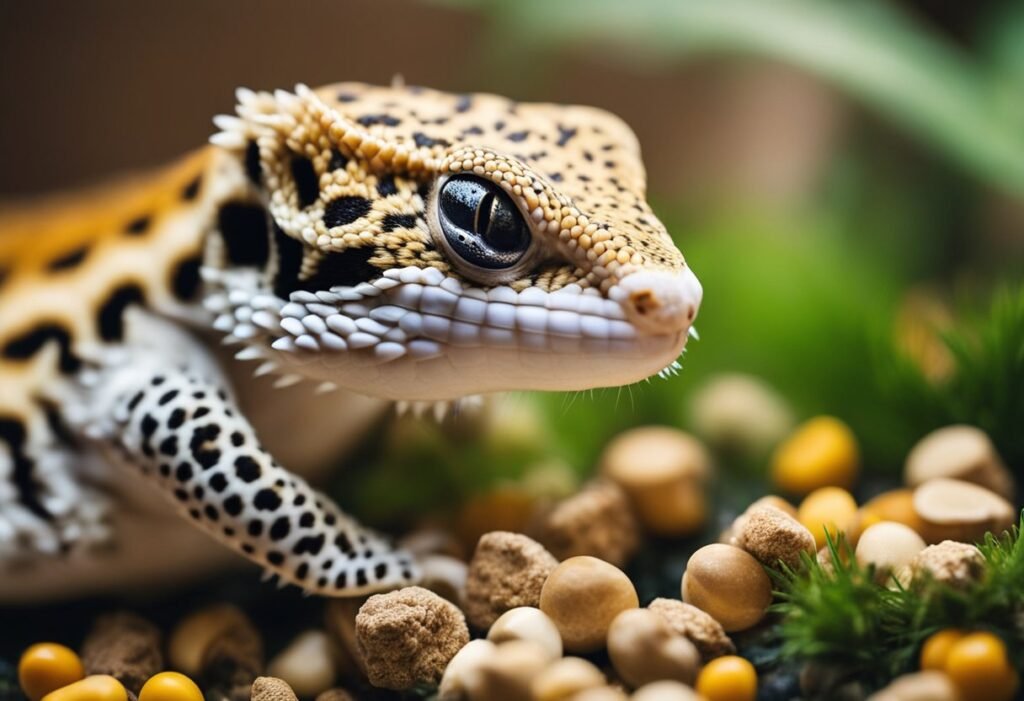
When it comes to feeding leopard geckos, bearded dragon pellets may not always be the best option. Fortunately, there are other alternatives that can provide your gecko with a balanced and nutritious diet. In this section, we will explore two such alternatives: live prey options and commercial leopard gecko foods.
Live Prey Options
Leopard geckos are natural hunters and thrive on a diet of live prey. Some suitable options include crickets, mealworms, waxworms, and roaches. These insects can be purchased from pet stores or online and are relatively easy to care for. It’s important to ensure that any live prey offered to your gecko is appropriately sized and gut-loaded with nutritious food prior to feeding.
Commercial Leopard Gecko Foods
Commercially available leopard gecko foods are another option to consider. These foods are specially formulated to provide a balanced diet for your gecko and may contain a variety of ingredients, such as insects, fruits, and vegetables. Some popular brands include Repashy and Pangea. It’s important to read the ingredients list and nutritional information carefully to ensure that the food meets your gecko’s dietary needs.
In conclusion, while bearded dragon pellets may be convenient, they are not the only option for feeding your leopard gecko. Live prey options and commercial leopard gecko foods can provide a balanced and nutritious diet for your gecko. As always, it’s important to consult with a veterinarian or experienced reptile keeper to ensure that your gecko’s dietary needs are being met.
Frequently Asked Questions
What insects are safe for leopard geckos to consume?
Leopard geckos can eat a variety of insects such as crickets, mealworms, waxworms, superworms, and roaches. It is important to gut-load the insects with a nutritious diet before feeding them to your gecko. Additionally, dusting the insects with a calcium and vitamin D3 supplement is crucial for maintaining good health.
Is it possible for leopard geckos to eat earthworms?
Yes, leopard geckos can eat earthworms. Earthworms are a good source of protein and nutrients for your gecko. However, it is important to make sure that the earthworms are not too big for your gecko to swallow.
Are there any vegetables that are safe for leopard geckos, like lettuce?
Leopard geckos are carnivorous and do not require vegetables in their diet. Feeding them vegetables, including lettuce, can cause digestive problems and should be avoided.
Can leopard geckos eat insects if they are not alive, such as dead crickets?
Leopard geckos should not be fed dead insects as they may contain harmful bacteria. It is best to feed your gecko live insects that are appropriately sized.
What treats are suitable for leopard geckos?
While treats should not make up a large portion of your gecko’s diet, occasional treats such as mealworms, waxworms, or small pieces of fruit can be given in moderation.
What constitutes a healthy diet for leopard geckos in captivity?
A healthy diet for leopard geckos in captivity should consist of a variety of appropriately sized insects, dusted with a calcium and vitamin D3 supplement, and occasionally supplemented with treats. It is important to avoid feeding your gecko insects that are too large or too frequent, as this can lead to digestive issues.

